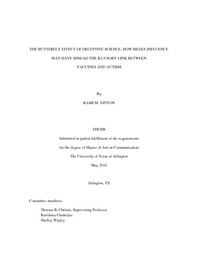
ATTENTION: The works hosted here are being migrated to a new repository that will consolidate resources, improve discoverability, and better show UTA's research impact on the global community. We will update authors as the migration progresses. Please see MavMatrix for more information.
Show simple item record
| dc.contributor.advisor | Christie, Thomas Bryan | |
| dc.creator | Vinton, Kami M. | |
| dc.date.accessioned | 2016-07-08T19:55:26Z | |
| dc.date.available | 2016-07-08T19:55:26Z | |
| dc.date.created | 2016-05 | |
| dc.date.issued | 2016-05-10 | |
| dc.date.submitted | May 2016 | |
| dc.identifier.uri | http://hdl.handle.net/10106/25762 | |
| dc.description.abstract | Delaying or refusing childhood vaccinations can increase a community’s risk of vaccine-preventable diseases. Agenda setting theory demonstrates that media can influence people's attitudes and opinions. One study in 1998 asserted that a vaccine/autism link existed, giving birth to one of the longest held myths in modern medicine. Shortly after its publication, the study was thoroughly discredited, and hundreds of subsequent studies have failed to find any link. Many parents who refuse vaccinations remain unconvinced by traditional science and favor anecdotal, pseudo-scientific accounts of the cause of and treatments for autism. Given the recent resurgence of once-eradicated vaccine-preventable diseases, it is possible that the mass media helped introduce and proliferate the false vaccine/autism link ideology. Fear learning can prompt persistent, irrational beliefs and behaviors. Thus, if news reports about autism were perceived as a threat to the health and/or safety of people’s children, the media might have been a factor in scaring people about autism, steering them toward the perceived safety of refusing vaccinations. Earlier media messages used more fear terminology than did later reports. Language expressing uncertainty about autism and the risk of developing it have remained equal through the years. | |
| dc.format.mimetype | application/pdf | |
| dc.language.iso | en_US | |
| dc.subject | Autism | |
| dc.subject | Vaccines | |
| dc.subject | Fear | |
| dc.subject | Mass media | |
| dc.subject | Health communication | |
| dc.subject | Science journalism | |
| dc.subject | False link | |
| dc.subject | Agenda setting | |
| dc.title | The butterfly effect of deceptive science: How media influence may have spread the illusory link between vaccines and autism | |
| dc.type | Thesis | |
| dc.degree.department | Communication | |
| dc.degree.name | Master of Arts in Communications | |
| dc.date.updated | 2016-07-08T19:56:30Z | |
| thesis.degree.department | Communication | |
| thesis.degree.grantor | The University of Texas at Arlington | |
| thesis.degree.level | Masters | |
| thesis.degree.name | Master of Arts in Communications | |
| dc.type.material | text | |
| dc.creator.orcid | 0000-0001-6533-3568 | |
Files in this item
- Name:
- VINTON-THESIS-2016.pdf
- Size:
- 1.141Mb
- Format:
- PDF
This item appears in the following Collection(s)
Show simple item record


